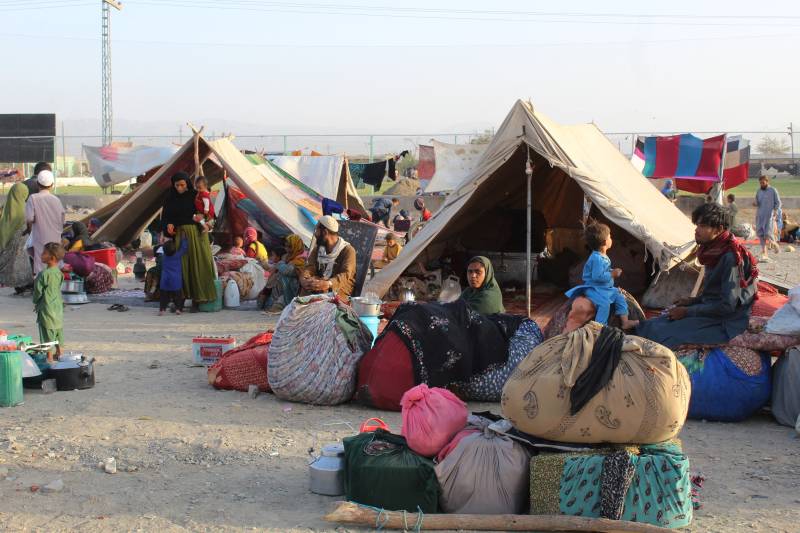The politics of Afghan refugees

Stay tuned with 24 News HD Android App

From all witness accounts inside Afghanistan, there is no amassing of Afghan refugees on the borders. There is, however, a genuine humanitarian crisis.
This crisis has been around for at least a year. It involves food drought, no salaries and no income with most government officials not having received salaries for the last six to eight months. Food insecurity exists for at least 70 percent of the Afghan population. Inevitably, without adequate aid, the situation will snowball into a humanitarian crisis which can lead to Afghans crossing over to Pakistan.
This inevitable influx of refugees can only be stemmed through an expedited flow of humanitarian assistance within Afghanistan.
Interestingly, the internal refugee status in Afghanistan is widespread given that people from smaller towns have converged to the cities in search of food and in recent weeks in search of relative security given that there was sporadic fighting within Afghanistan’s outlying areas.
This humanitarian crisis requires the international community, led by the United Nations Commission on Refugees (UNHCR). Some support has been forthcoming with Pakistan becoming the mainstay of this effort by virtue of and providing corridor for the transportation of humanitarian staff and goods to be transported to Afghanistan’s five main centers from where food supplies are being distributed.
A concerning running parallel, if not ahead of the humanitarian concern, has been the western community’s anxiety for Afghan refugees. Led by the US, UK and EU states, they are keen to allow the exit of all Afghans desperate to leave Afghanistan. The matter is not a straight and simple one. Rewind and go back to the fall of Kabul which was accompanied by western embassy announcements that they would depart Afghanistan along with all the Afghans who had worked with their respective institutions.
The Americans had the largest numbers working for them and the announcement which suggested guaranteed departure of their Afghan associates for western countries was on minimal documents, evoked horrific mayhem, deaths and suicide bombings at Kabul airport. Unforgettable scenes of human desperation- a descent to levels of self-destruction- as if the Pied Piper’s call to the end of the world.
If the fear among millions of Afghans of the cruel and heartless 90’s rule of the Taliban lingered on, the call for exit by western embassies further exacerbated both the fear and the desire to leave. Whether it was the American ‘dream’ or European ‘freedoms’ addressing the economic and security issues of millions of Afghans, this was the deluge… the immovable gathering of thousands at Kabul airport.
Thousands flew off, transported mostly in gigantic military planes. Imagine what dreams, what fears and what apprehensions must their hearts and minds have been possessed by, as the big bird took them to lands far off.
Now, the second generation is repeating the exodus but of a different kind. Who knows with what dreams, what apprehensions and indeed leaving home and hearth with what trepidations. Who knows what awaits them in the lands of freedom and of opportunity! Just think: Islamophobia and scarcity. Former German Chancellor Helmet Schmidt’s forewarning of the 70’s when the German capitalist brought Turkish labor in droves, of a “social disequilibrium.” Years later, Jean Mohr and Peter Berger lamented the pain of Turkish labor in their classic works, especially The Seventh Man.
These are inevitabilities no matter when, from where and how the exodus is forced. Driving droves away from ancestral homelands in alien zones is like uprooting the old oak and the juniper trees. No matter how long the separation is, the DNA remains intact. The core identity mutates but never evaporates.
The present Afghan pain and apprehension comes as the days of Taliban haunt the Afghans and the future road map.
Yet, the call to neighboring countries, Pakistan above all, to open their borders to refugees is unwise. Unthinking. Indeed the US, Canada, EU and others are happy to allow in a few thousands. No more. They are reportedly concerned about the socio-economic impact of a greater number.
Hence the convenient call is to neighbors, to Pakistan who already hosts around four million. The wise step ought to be to pump in humanitarian aid, keep the pressure on the Taliban to ensure governance by common sense and by granting citizens’ rights.
The international community, the Troika-Plus and the bordering countries initiative shortly to be launched, must stay focused on Taliban’s better governance.
The people of Afghanistan deserve to stay home where they must be first-class citizens and enjoy all the opportunities that citizens in Muslim countries enjoy.
Encouraging Afghans to exit their Motherland as refugees, is at best a naïve approach and at worst an attempt to continue the battle with the Taliban through other means. Instead, it’s got to be Taliban reformation time, through firm and collective steps by the global community.
- Nasim Zehra is an author, analyst and national security expert.
Twitter: @NasimZehra
Courtesy Arab News
